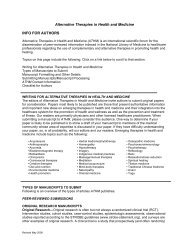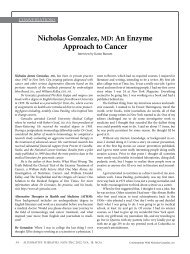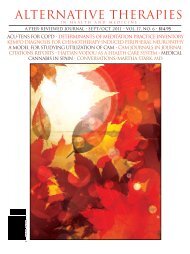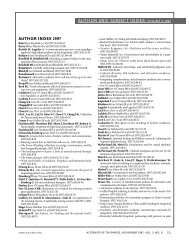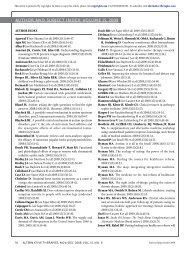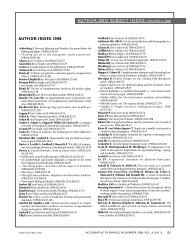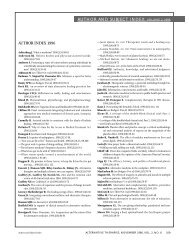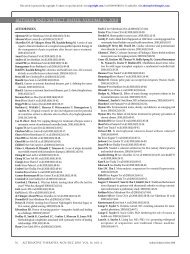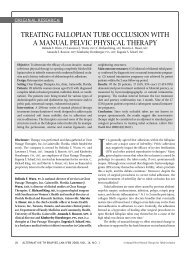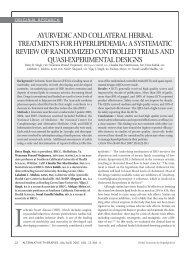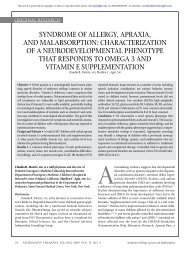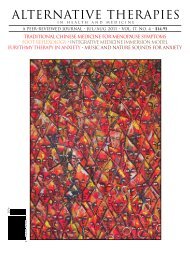Alternative Therapies In Health And Medicine
Alternative Therapies In Health And Medicine
Alternative Therapies In Health And Medicine
Create successful ePaper yourself
Turn your PDF publications into a flip-book with our unique Google optimized e-Paper software.
Table 1 Major Evidence of Nonpharmaceutical Treatments of Depression, continued<br />
<strong>In</strong>tervention Mechanisms of Action* Key Evidence† Summary of Results<br />
Cognitive<br />
behavioral<br />
therapy;<br />
<strong>In</strong>terpersonal<br />
skills;<br />
Psychoeducation<br />
Enhances neuronal plasticity;<br />
modulation of limbic brain<br />
center activity; increased serotonin<br />
and GABAergic effects;<br />
brain imaging shows posttreatment<br />
activity in temporal<br />
lobe, hippocampal, and cingulated<br />
areas<br />
Psychological Techniques (Major <strong>In</strong>terventions)<br />
Meta-analyses and<br />
reviews:<br />
Cuijpers 2008 118 ;<br />
Bell 2009 77 ;<br />
Donker 2009 70 ;<br />
Wolf 2008 17<br />
RCTs consistently show psychological<br />
interventions to be<br />
effective in reducing depression;<br />
evidence supports the<br />
longer term effects carry on<br />
after treatment is ceased<br />
Evidence<br />
Level Comment<br />
A<br />
Important intervention for<br />
depression with a psychological<br />
or external life stressor<br />
trigger. Referral may be<br />
required to qualified psychologists<br />
in higher levels of<br />
depression or pronounced<br />
distress<br />
Level A: meta-analyses or 2 or more RCTS with positive results; Level B: more than 2 RCTS, mainly positive results; Level C: nonreplicated RCT or mixed evidence<br />
from several RCTs. Abbreviations: HPA, hypothalamic-pituitary-adrenal; SJW, St John’s wort; MDD, major depressive disorder; RCT, randomized controlled trial;<br />
HDRS: Hamilton Rating Scale for Depression; NMDA, N-Methyl-D-aspartate; GABA, γ-Aminobutyric acid; CVD, cardiovascular disease; 5-HTP, 5-hydroxytryptophan;<br />
MAOI, monoamine oxidase inhibitors; SSRI, selective serotonin reuptake inhibitor; TCA, tricyclic antidepressant. *See article text for references. †First author<br />
of study included.<br />
and the enhancement of cell membrane fluidity. 50-52<br />
The use of acupuncture to treat depressive disorders has<br />
been documented in traditional Chinese medical texts. 53 Reviews<br />
and meta-analyses of small randomized controlled trials indicate<br />
that acupuncture can significantly reduce the severity of depression<br />
on the Hamilton Depression Rating Scale (HDRS) 54 or Beck<br />
Depression <strong>In</strong>ventory (BDI). 55 Significant effects on reducing<br />
depression occurred compared to nonspecific or sham acupuncture<br />
or massage, while equivocal efficacy compared to tricyclic<br />
antidepressants also was revealed. It should be noted that not all<br />
studies are positive and that the poor methodology used in many<br />
studies preclude acupuncture as having a higher level of evidence.<br />
Further, due to methodological challenges (eg, blinding<br />
and a strong placebo effect from sham acupuncture points), it<br />
often is difficult to draw definitive conclusions. Acupuncture has<br />
been documented to interact with opioid pathways, and substances<br />
that modulate these pathways have been shown to have<br />
antidepressant activity. 56 Other possible antidepressant mechanisms<br />
of action include increased release of serotonin and norepinephrine<br />
and cortisol modulation. 57<br />
Lifestyle. General lifestyle advice should focus on encouraging<br />
a balance between meaningful work, adequate rest and sleep,<br />
moderate exercise, positive social interaction, and pleasurable<br />
hobbies. Dietary programs designed to treat depression have not<br />
been rigorously evaluated to date; however, cross-sectional studies<br />
by Akbaraly et al 58 and Jacka et al 59 have revealed that a healthy<br />
diet rich in complex carbohydrates, fruits and vegetables, and<br />
lean meats and low in processed foods reduces the risk of depression.<br />
Although evidence supporting specific nutritional advice is<br />
currently lacking, a basic balanced diet including foods rich in a<br />
spectrum of nutrients can be recommended. Among important<br />
nutrients for neurochemical function, adequate folate consumption<br />
is vital. Folate is involved with the methylation pathways in<br />
the “one-carbon” cycle, responsible for the metabolism and synthesis<br />
or various monoamines, and notability involved with the<br />
synthesis of SAMe. 41 Higher rates of folate deficiency have been<br />
found in people with depressive disorders compared to their nondepressed<br />
counterparts. 60,61 Foods rich in omega-3, L-tryptophan,<br />
B and C vitamins, zinc, and magnesium are recommended, as<br />
they are necessary for the production of neurotransmitters and<br />
for neuronal communication. 62 These include whole grains (zinc,<br />
magnesium, B vitamins) lean meat (zinc, magnesium, protein, eg,<br />
tryptophan), deep-sea fish (essential fatty acids), green leafy vegetables<br />
(vitamin C, folate), colored berries (vitamin C, antioxidant<br />
phenolic compounds), and nuts (monounsaturated fats, vitamin<br />
E, zinc, magnesium). 63 A strong causal link between substance or<br />
alcohol abuse/dependence and MDD has been established, and<br />
depression, in turn, increases the risk of substance and alcohol<br />
misuse. 64,65 <strong>In</strong> such cases, supportive advice on curtailing the use<br />
of alcohol or recreational drugs and/or referral to an appropriate<br />
treatment program can be provided.<br />
<strong>In</strong>creasing physical activity is advised if the patient has a<br />
sedentary lifestyle and is especially indicated in cases of obesity.<br />
Associations between greater physical activity and improved<br />
mood and well-being have been documented. 66,67 As is indicated<br />
in Table 1, many RCTs have revealed that exercise is effective in<br />
reducing symptoms of depression, with meta-analyses of clinical<br />
studies of exercise showing a significant effect in favor of<br />
physical exercise compared with control conditions (routine<br />
care, waitlist, meditation/relaxation, or low-intensity<br />
exercise). 68 Evidence also exists for the use of yoga to reduce<br />
depression and improve mood, with several RCTs revealing<br />
mostly positive results. 69 The methodologies were, however,<br />
commonly poorly reported, and therefore these interventions<br />
cannot currently be considered as “gold-standard” grade<br />
A–level evidence. The biological antidepressant effects of exercise<br />
include a beneficial modulation of the HPA-axis, increased<br />
expression of 5-HTP, and increased levels of circulating testosterone<br />
(which may have a protective effect against<br />
depression). 67,68<br />
An Evidence-based <strong>In</strong>tegrative CAM Model for Depression<br />
ALTERNATIVE THERAPIES, jul/aug 2011, VOL. 17, NO. 4 31



